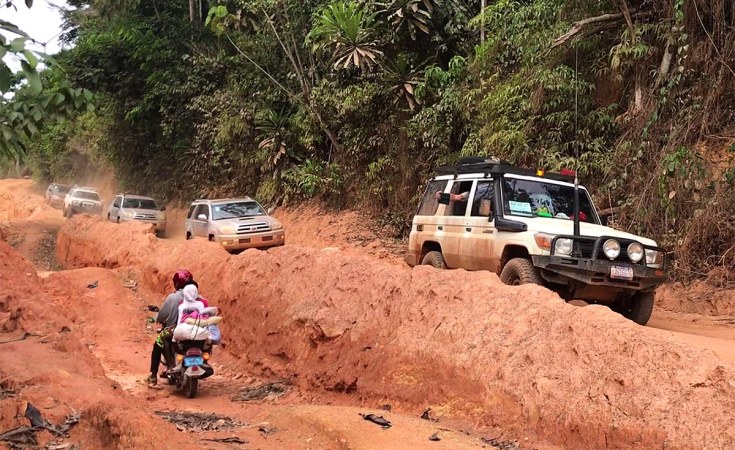Monrovia — The first witness took the stand on Wednesday in the Liberia hearings of the appeal of former Revolutionary United Front commander Gibril Massaquoi's 2022 acquittal on charges of war crimes. The woman, whose identity is being withheld for her security, told the three-judge panel of the appeal court which has relocated from Finland for the hearings, that her sister was killed on the order of Massaquoi under the bridge near Waterside market.
The witness said she and her sister had gone with other civilians to a biscuit store to buy food when they were detained by the soldiers who took them under the bridge and beat them. She said that one of the soldiers attempted to rape her sister. The witness claimed her sister resisted and Massaquoi ordered the soldier to kill her.
The witness repeated testimony that was heard from many witnesses in the 2021 hearings in Liberia of a lower court Finnish court that tried Massaquoi for war crimes and crimes against humanity allegedly committed in Liberia in support of Massaquoi's ally Charles Taylor. The Finnish court was trying Massaquoi, a Sierra Leonean, because he and his family had been relocated to Finland in exchange for testifying against Taylor and Sierra Leoneand rebel leaders in the Special Court for Sierra Leone. Massaquoi was not given immunity from prosecution for crimes committed in Liberia.
The lower Finnish court acquitted Massaquoi of the charges after a 15-month trial finding prosecutors did not prove his guilt beyond a reasonable doubt. Prosecutors have appealed that ruling leading the appeals court to return to Liberia to hear from witnesses again.
One main task for prosecutors is to clear up inconsistencies from the trial. Today's witnesses did not help.
Today's first witness told Finnish Police investigating the case in 2020 that the only time she was Massaquoi was at the store. But in the court today she said that was her second time seeing Massaquoi. In another incidence she told police those who were unwilling to leave the store were killed in the store, but she told the court that she didn't know if anyone was killed in the store.
The second witness was man who testified that he and his older brother, had gone to sell plastic bags when they heard that a store had been looted and people were getting biscuits. The witness said he and his brother had gone there to get some of the biscuits when a group of soldiers captured them and took them under the bridge. He alleged Massaquoi took his brother and another person from the group and shot them dead with a pistol.
The witness broke into tears as he recalled Massaquoi allegedly ordering the soldiers to shoot the remaining civilians.
Massaquoi's defense lawyer reminded the witness that he told the Finnish police there were also ATU (Anti-Terrorist Unit of then-President Charles Taylor) present at the bridge during the incident, but the witness said he could not remember if he said that.
A third witness, a man, alleged that he and his two brothers had gone to Waterside to look for food when they heard a biscuit store had been opened. He said when they got there, they met group of people going in and out of the store with biscuits and his brother entered the store.
He alleged a man arrived with a group of soldiers and ordered them to shoot the civilians that they were spies. He said the soldiers open fire on his brother and the other civilians and his brothers were killed.
The third witness alleged he was arrested by the soldiers while trying to escape and was turned over to their commander who introduced himself as "Gabriel Massaquoi."
He said Massaquoi said he is known in Sierra Leone as "Gibril." According to the witness Massaquoi said his name was "Angel Gabriel, who can send people to God."
The inconsistencies in dates that plagued the trial continued in today's hearing. Three of the four witnesses said the Waterside incidents occurred between 2001 and 2002, while one said the incident it between 2002 and 2003. According to the defense, everyone previously interviewed by the Finnish Police and during the trial hearings said the incident occurred in 2003.
The dates are crucial because Massaquoi was in a safehouse under the protection of the United Nations from April of 2003. The events that witnesses have described at Waterside were traced to the period in July and August in 2003 when LURD rebels attacked Monrovia in a conflagration known to Liberians as "World War Three" which ended when Charles Taylor was persuaded to go into exile, finally ending the 14-years of civil conflict. If he escaped the safehouse to commit crimes on behalf of Taylor in Liberia it would cast a cloud over the Special Court and its witness protection program.
All the witnesses gave different reasons for the inconsistencies in their accounts. The first of the three blamed her illiteracy.
"The thing has stayed long, and I have forgotten everything," said the witness. "I am not educated, so I didn't write everything down."
One of the men said he was 19-year-old when the events took place and he was "traumatized" and so unable to remember exact dates.
In an interview with FPA/NN about the inconsistences in the witnesses' accounts, defense lawyer Paula Sallinen said that her team works hard to pick up the inconsistencies that undermine the case against their client.
"That is something court has to address when it gives out the verdict," said Sallinen. "So, one can say they are confused, about the year, but actually they are talking about 2003 or that these incidents happened before 2003 which is not in line with historical facts."
The trial continues on Monday.
The coverage of the appeal of Massaquoi's acquittal is a collaboration with New Narratives as part of the West Africa Justice Reporting Project.


